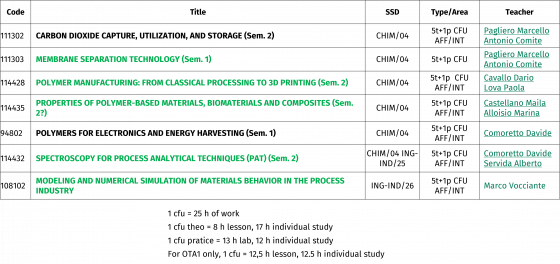News
On 17 October 2023, the Borealis Innovation and Technology team announced the winners of the Borealis Scientific Innovation Award (BSIA) and the InnoTech Recognitions at the Borealis Innovation Day in Linz, Austria. One of the winners comes from DCCI-Genoa: Winners of the Borealis Scientific Innovation Award.
MSc CONTENTS
Sustainable polyMer And pRocess chemisTry (SMART) provides a unique opportunity to acquire skills in chemistry and technology of polymeric materials, sustainable industrial chemical processes oriented to the circular economy, environmental protection, and end-of-life management of materials.
The MSc is designed to form multidisciplinary scientists and professionals who will serve national and international companies to solve technological and process problems in a wide range of sectors, including those at the interface between chemistry, processes and engineering. In particular, the training program is designed to provide knowledge and skills related to:
- Sustainable development of new chemical processes focusing on 'product design' rather than ‘process design’, addressing environmental problems such as waste limitation by smart re-conversion into new chemical feedstock.

- Sustainable design of smart polymer, inorganic and hybrid materials from natural sources, meeting the needs of the modern market and industry, ensuring their reuse and recycling according to circular economy.

- Developing micro- and nanostructured polymeric and hybrid materials with smart properties to meet the sustainability challenges of modern society (CO2 emissions reduction, energy saving, environmental and water remediation, atoms economy, catalysis and photocatalysis) within the framework of the 12 principles of Green Chemistry.

- Technical and managerial issues related to polymers and inorganics recycling and environmental remediation.
Specialized lectures and seminars are also offered by skilled experts from companies and associations on topics related to sustainability, recycling, circular economy, and on intellectual property management.
ADMISSION
Bachelor's degree in Italy or an equivalent degree abroad, English B2 proficiency is required. Applicants must demonstrate the following:
- CURRICULAR REQUIREMENTS:
Suitable personal preparation in inorganic chemistry, organic chemistry, physical chemistry, analytical chemistry, engineering, mathematics and physics joined to chemical laboratory skills is required.
- PERSONAL REQUIREMENTS:
Applicants must have excellent academic records. The quality of the bachelor, the CGPA, and the ranking of the degree-granting University will also be considered in the admission process.
WHAT YOU WILL LEARN
FIRST YEAR (52 credits)
The first year is mainly devoted to basic principles of Polymer Science, Industrial Chemistry and Process Chemistry.

Students are also allowed to select an optional class.
SECOND YEAR
The second year is mainly devoted to deepening knowledge on polymer synthesis, eco-design of materials, and recycling problems for both inorganic and polymer materials in a circular economy perspective. An additional optional class is available as well as focus groups on hot scientific and technological topics, language deepening (Italian language for foreigners and advanced English for italian students), and industrial seminars on MSc topics and on intellectual property management.

Optional Courses will focus on the following topics:

The SMART MSc ends with a Master Thesis where students will have the chance to apply the contents learnt to cutting edge technological and fundamental research topics.
TEACHERS LIST
SOFT SKILLS & EMPLOYMENT
SMART offers the opportunity to improve soft skills as well as professional orientation through activities related to Seminars, Thesis Project, Industrial Meetings, Visits to Companies and Industrial Plants.
MASTER THESIS
SMART provides several opportunities for INDUSTRIAL and/or RESEARCH thesis on hot applied and fundamental topics.
- Nano- and Meso-structures for sensing, biomedicine and advanced photocatalysis.
- Electrospinning of polymer membranes and composites.

- Semicrystalline polymers: processing, structure, properties & additive manufacturing.
- Hybrid and polymer nanostructures for sustainable photonics.
- Design and development of new bioplastics.
- Polymer gels for biomedical and environment management.
- Membrane processes: from synthesis to technology of water treatment and environmental recovery.
- Development of industrial catalysts for hydrogen economy processes
- Simulation, modelling and engineering of physical-chemical sustainable processes.
- Process System Engineering and Process Analytical Technologies.
Additional topics are also available at Italian and foreign Research Institutes, within the Erasmus programs, and at Industrial partners (recently, Evonik. Solvay, Iplom, Biochemtex, Infineum, Eni, Lamberti, Proplast, Boero, Ecospray Technologies, …).
JOB PLACEMENT
The SMART graduate is a flexible professional figure who can have access to several industrial and academic positions:
- R & D in Industry or Academia
- Industrial production and operation
- In-line quality control
- Product and technology developer in the polymer and process industry
- Waste/water treatment technologies and processing
- Energy management
- Commercial product management
- Data Science
- HSE (Health, Safety and Environment)
- Doctorate schools
CONTACTS
For any further info, please contact the Master Coordinator (Prof. Davide Comoretto)
e-mail: coordinatore_CCS_Chim_Ind@unige.it
Address: Università degli Studi di Genova, Dipartimento di Chimica e Chimica Industriale, via Dodecaneso 31, 16146 Genova (Italy)
Web: https://chimica.unige.it/node/1816
FURTHER READINGS
In order to possess a minimum background to tackle the SMART MSc programme, applicants might read:
BOOKS (fundamental issues)
- Introduction to Synthetic Polymers by, Ian M. CAMPBELL, Oxford University Press, 2000
- Elements of Chemical Reaction Engineering by H. Scott FOGLER, Pearson, 2020
- Mass Transfer Operations, Robert TREYBAL, McGraw Hill, 1980
PAPERS
- Nature Communications volume 8, 15611 (2017)
- Nature Communications volume 9, 2157 (2018)
- Scientific Reports volume 8, 4666 (2018)
- Chem. Eng. News, 2018, 96(12); 5
- Xin Lu et al., Nature 606, 511–515 (2022)
- https://closetheglassloop.eu/
- Environ. Sci. Technol. 2018, 52, 8, 4835–4841
- European Commission, Directorate-General for Internal Market, Industry, Entrepreneurship and SMEs, Grohol, M., Veeh, C., Study on the critical raw materials for the EU 2023 – Final report, Publications Office of the European Union, 2023, https://data.europa.eu/doi/10.2873/725585
- https://eurometaux.eu/media/20ad5yza/2022-policymaker-summary-report-final.pdf
- https://op.europa.eu/en/publication-detail/-/publication/57318397-fdd4-11ed-a05c-01aa75ed71a1
- Current Opinion in Green and Sustainable Chemistry 2018, 13:1–7
Additional suggestions are available on request.
Link to the SMART presentation for the Acedemica Year 2025-2026:
